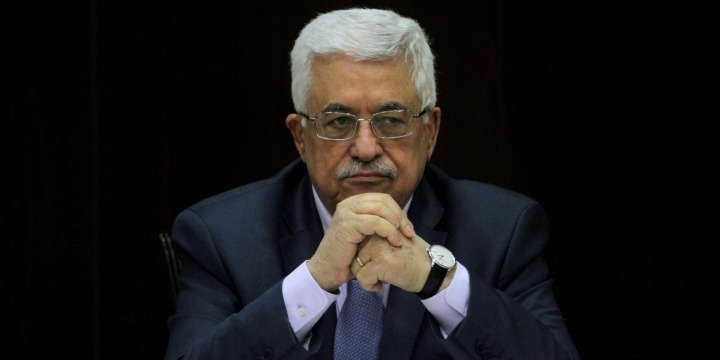The Post-Abbas Era
 by Ido Zelkowitz
by Ido Zelkowitz

Palestinian Authority President Mahmoud Abbas chairs a Palestinian cabinet meeting in the West Bank city of Ramallah, July 28, 2013. Photo: Reuters / Issam Rimawi / Pool / File.
The Fatah movement and the PLO leadership are experiencing a deep internal and external crisis. In retrospect, its leader Mahmoud Abbas has failed to achieve the establishment of a vital and sovereign Palestinian independent state according to the 1967 borders. Abbas, who is now in the final stretch of his term of office, has three goals: to leave a legacy, to put policy guidelines in place for the future, and to select his political heir.
To ensure that the issue of succession will not generate internal warfare in Fatah, the leadership must create a mechanism that will help the movement stabilize rivalry in its high command. We can assume that Abbas will do everything he can to influence the choice of his successor.
A second important point: It seems that in the new, post-Abbas Fatah, the leadership is going to be more focused on Palestinian domestic affairs. After the election of Abbas’ successor, one can expect Fatah leaders to try to find an answer to Hamas’ challenge to what they perceive as their historical birthright as leaders of the Palestinian national movement.
Hamas would like to see reforms and elections take place in PLO institutions that would allow it to integrate into the PLO and take it over from within. This would allow Hamas to replace Fatah as leader of the Palestinian national movement and gain inter-Arab and international legitimacy.
In the short term, a change in PA leadership will have only a small impact on its ability to move forward with the peace process. As long as the Palestinians are focused on their own domestic politics, the chances for progress on the Israeli-Palestinian track are slim.
Ido Zelkovitz is the head of the Middle Eastern Studies program at Yezreel Valley College, a policy fellow at Mitvim – The Israeli Institute for Regional Foreign Policies, and a research fellow at the Ezri Center for Iran and Persian Gulf Studies at the University of Haifa.
 Iran Sentences Rapper Toomaj Salehi to Death Over 2022-23 Unrest
Iran Sentences Rapper Toomaj Salehi to Death Over 2022-23 Unrest Netanyahu: ‘Antisemitic Mobs Have Taken Over Leading U.S. Universities’
Netanyahu: ‘Antisemitic Mobs Have Taken Over Leading U.S. Universities’ U.S. Decides Against Sanctions on IDF’s Netzah Yehuda Battalion
U.S. Decides Against Sanctions on IDF’s Netzah Yehuda Battalion Israel Says It Is Poised to Move on Rafah
Israel Says It Is Poised to Move on Rafah Israeli Hostage Hersh Goldberg-Polin Seen Alive in a New Hamas Video
Israeli Hostage Hersh Goldberg-Polin Seen Alive in a New Hamas Video Palestinian Prime Minister Announces New Reform Package
Palestinian Prime Minister Announces New Reform Package France: Man Suspected of Abducting, Raping Jewish Woman ‘to Avenge Palestine’
France: Man Suspected of Abducting, Raping Jewish Woman ‘to Avenge Palestine’ Israel Intensifies Strikes Across Gaza, Orders New Evacuations in North
Israel Intensifies Strikes Across Gaza, Orders New Evacuations in North Iran Threatens to Annihilate Israel Should It Launch a Major Attack
Iran Threatens to Annihilate Israel Should It Launch a Major Attack ‘Completely Baseless’: Reports of Mass Graves at Gaza Hospitals are False, IDF Says
‘Completely Baseless’: Reports of Mass Graves at Gaza Hospitals are False, IDF Says



 Iran Sentences Rapper Toomaj Salehi to Death Over 2022-23 Unrest
Iran Sentences Rapper Toomaj Salehi to Death Over 2022-23 Unrest Israeli Hostage Hersh Goldberg-Polin Seen Alive in a New Hamas Video
Israeli Hostage Hersh Goldberg-Polin Seen Alive in a New Hamas Video Israel Says It Is Poised to Move on Rafah
Israel Says It Is Poised to Move on Rafah U.S. Decides Against Sanctions on IDF’s Netzah Yehuda Battalion
U.S. Decides Against Sanctions on IDF’s Netzah Yehuda Battalion Netanyahu: ‘Antisemitic Mobs Have Taken Over Leading U.S. Universities’
Netanyahu: ‘Antisemitic Mobs Have Taken Over Leading U.S. Universities’